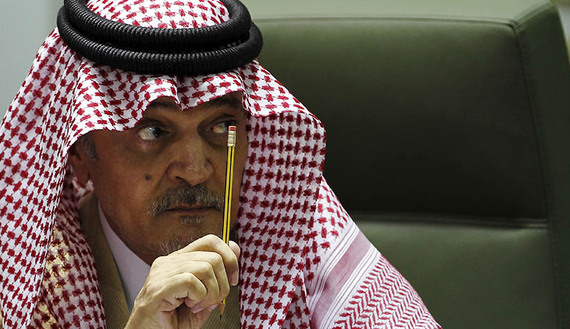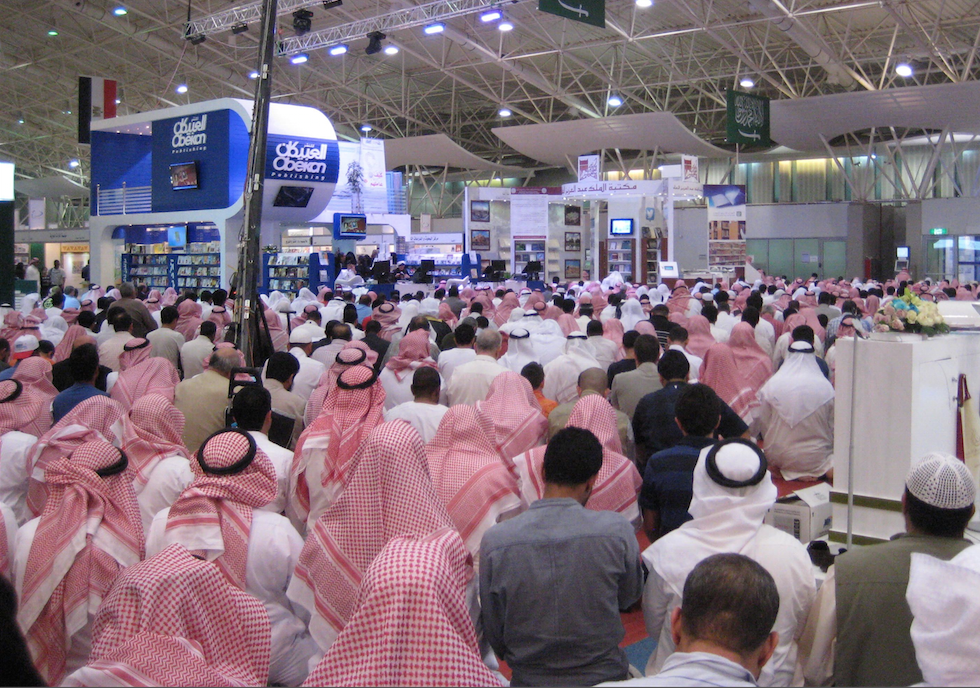
RIYADH, Saudi Arabia — Few Saudi decisions have provoked as much mystification as the recent one designating the Muslim Brotherhood a terrorist organization, a move described by some Saudis in recent interviews as "weird," "emotional" and "stupid."
On March 7, the Interior Ministry statement formally overturned a partnership of more than half a century that despite some rocky periods had benefited both the Saudi government and the Islamist movement.
The relationship's abrupt rupture has created confusion and fear, say many Saudis. While the Brotherhood has no overt organization in the kingdom — all political parties are banned — its ideology enjoys widespread sympathy. And several generations of Saudis were raised in an educational system whose curriculum was heavily influenced by Brotherhood ideas.
"There are many people who are not in the Brotherhood but think it is an OK organization," said a Saudi university professor who asked not to be named. "We've had the Brotherhood here without any terrorism for 50 years."
The government now risks alienating this sector of the population that is generally well-educated and prominent among the staff of state, religious and media organizations. Despite sporadic demands from Brotherhood-inspired activists for political restraints on the monarchy, the sector has never openly challenged the government — and at times supported it against violent Islamists.
The Saudi decision also created a new divide in the Sunni world at a time of deep tensions in the faith, as well as rising sectarian feelings pitting Sunni against Shiite. It is likely to complicate the kingdom's relations with many other countries where Brotherhood-affiliated organizations are significant political players, such as Jordan, Bahrain and Kuwait.
The Saudi rift with Qatar centers on differing views of the Brotherhood. Riyadh's break with the Brotherhood will be another point of disagreement in already strained ties between Saudi Arabia and Washington, whose diplomats openly engage with Brotherhood-affiliated groups in many countries.
So far, only Egypt, which declared the Brotherhood a terrorist group in December, and the United Arab Emirates have fully endorsed the Saudi designation.
In a recent interview, Jeddah-based lawyer Bassim Alim said, "It's going to severely backfire in the sense that throughout the Arab and Islamic world, the Muslim Brotherhood is known to be a nonviolent entity and ideology. Up to now … even the Salafi movements around the world that have been traditionally close to Saudi Arabia have rebuffed the Saudi position vis-a-vis the Brotherhood."
Some observers said they are concerned that with the Brotherhood off-limits, Saudi and Egyptian youths may gravitate to more militant underground groups.
"It is a big, very shocking decision that I don't think has been absorbed yet by the people in the region or the international community," said Radwan Masmoudi, president of the Washington-based Center for the Study of Islam and Democracy. "At a time when Saudi Arabia wants to be the leader of the Sunni world, I think it's very, very damaging to their own interests. … I don't think it was well thought out."
Founded in Egypt in 1928, the Muslim Brotherhood is the oldest Islamist political organization in the Muslim world and one of the most controversial. Some see it as a group of dedicated, pious Muslims promoting a nonviolent Islamic identity and worldview. Others regard it as a threatening, totalitarian-like incubator of violent Islamic militancy.
Depending on one's view of the group, the Saudi move was akin to banning Rotary International or the American Communist Party.
"The decree was really weird and strange because it's against reality," said Salman al-Oadah, a religious leader and critic of the Saudi government's crackdown on dissent, in an interview in Jeddah. "The Muslim Brothers are not terrorists. They don't believe in violence."
"I have spent the last 10 years criticizing al-Qaeda continuously" for being a terrorist group, Oadah added. "But the Muslim Brotherhood … to be objective, calling it a terrorist group, it's unjust. You can call them a political group, but I don't think for practicing politics they can be called terrorist."
Mohsen al-Awajy, who was active in the 1990s Saudi opposition movement Sahwa al-Islamiyya (Islamic Awakening), which was shaped by the Brotherhood's vision of political Islam, called the Interior Ministry statement an "emotional decree." He said, "This is why I haven't announced any reaction to that."
Seated beneath a bank of more than a dozen televisions in his Riyadh office, Awajy added, "We advised all of our brothers, all of our friends, to remain calm and not to react against this emotional action. We believe it's not going to last for a long time."
Riyadh's decision was partly a show of solidarity with Egypt's military junta, which dislodged the Brotherhood-dominated government there in a coup last July. It was also meant to silence internal criticism of the government's support for the coup. Awajy, for example, said he posted an online petition denouncing the coup — and implicitly Riyadh's backing for it — that garnered thousands of signatures before the government forced him to remove it.
The government's terror designation also appears to have been influenced by the discovery that Sahwa networks were allegedly recruiting youths to join the Syrian rebels, said a Saudi researcher. While the Saudi government supports the Syrian rebellion, it has forbidden young Saudis from joining the rebels, some of whom are linked to al-Qaeda, fearing they will become radicalized by the experience.
"The Muslim Brotherhood is sending [and] encouraging people to go to fight in Syria from Saudi Arabia and from outside," said Saud al-Sarhan, director of research at the King Faisal Center for Research and Islamic Studies in Riyadh.
"It's the first time this group of the Sahwa goes in a very obvious way to fight in Syria and to ask people to join them," Sarhan added, noting that some young Saudis killed fighting in Syria were from families active in the Sahwa movement.
The ministry statement makes even the mildest demonstration of sympathy for the Brotherhood — as well as al-Qaeda-linked groups — a criminal offense, including the use of supportive slogans or symbols. Soon after the statement came out, many Saudis cleansed their Twitter and Facebook profiles of the four-finger image meant to show solidarity with the Brotherhood and the families of those killed by Egyptian troops in the August 2013 attack on protesters in Cairo's Rabia al-Adawiya Square.
A senior government official said in an interview that Brotherhood networks in the kingdom had "started organizing people," but that sympathizers would not be arrested unless they "do actions."
Several Saudis said the government could not possibly arrest all Brotherhood sympathizers, but that it might use the new terror label selectively to silence critics or alleged troublemakers.
In a statement from its London press office, the Brotherhood said it was "surprised" and "distressed" by the Saudi move, which "contradicts entirely with its historical relations with the Muslim Brotherhood." It added, "History has proven that the Muslim Brotherhood has always been a pioneer when it comes to spreading correct Islamic ideologies that are free from extremism, and this is what a lot of trustworthy scholars from within Saudi Arabia have testified for."
The Brotherhood's origins in the kingdom go back to the 1950s and 1960s when the monarchy welcomed members being persecuted by Egypt's Gamal Abdel Nasser and other Arab leaders. Although not permitted to formally organize, they flourished in a spiritual environment congenial to their Islamic ideology. They also found jobs in the expanding Saudi bureaucracy and raised funds for their work.
However, relations between the Brotherhood and the monarchy grew increasingly tense over the years because of the Sahwa's activities, including its opposition to US troops in the kingdom during the Gulf War. More recently, Riyadh was angered by the Brotherhood's role in helping unseat its old ally, former Egyptian President Hosni Mubarak, and mismanaging the Egyptian economy.
It also feared that the Brotherhood's electoral victory in Egypt would inspire the Sahwa to begin agitating again for political reform.





